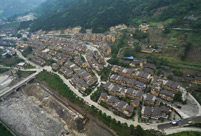 First overseas "China-standard" electric railway laid
First overseas "China-standard" electric railway laid
 College graduate launches organic agricultural cooperative in hometown
College graduate launches organic agricultural cooperative in hometown Guizhou Earthquake Emergency Rescue Team takes part in emergency exercises
Guizhou Earthquake Emergency Rescue Team takes part in emergency exercises Giant Spider-Man appears in Fuzhou
Giant Spider-Man appears in Fuzhou
 Beautiful Chinese-built roads in Africa
Beautiful Chinese-built roads in Africa Sagya Monastery in Tibet
Sagya Monastery in Tibet
 Young Chinese drive consumption
Young Chinese drive consumption
 The life of a model: Not as glamorous as it seems
The life of a model: Not as glamorous as it seems
 Hello Kitty, happy 40th birthday!
Hello Kitty, happy 40th birthday!
 The Western Qing Mausoleum
The Western Qing Mausoleum
Investments in joint projects concentrate on infrastructure, tourism and logistics sectors
The Russia-China Investment Fund has sunk about $1 billion into three infrastructure, tourism and logistics deals, and a senior executive told China Daily that investing in agriculture and natural resources sectors will be next on the agenda.
"China is Russia's largest trading partner and an important partner of RDIF," Kirill Dmitriev, CEO of the Russian Direct Investment Fund, said on Monday.
"With deals in infrastructure, tourism and logistics made, we will pay attention to opportunities in sectors including agriculture and natural resources."
The three deals will be signed during Russian President Vladimir Putin's working visit to China on Tuesday and Wednesday.
They include the first Russia-China railway bridge across the Heilongjiang River, called the Amur River in Russia; tourism and senior living infrastructure in the two nations; and investment in the Chinese division of leading logistics provider Global Logistic Properties Ltd.
The Russia-China Investment Fund made the first deal last year with the acquisition of an approximately 42 percent stake in Russian Forest Products Group.
The railway bridge's construction will create a new export corridor between Russia and China, and alleviate transport constraints between new fields being developed in Russia's Eastern Siberia and the Far East.
The bridge also will significantly increase the turnover of goods and the competitiveness of Russian producers and exporters, reducing transportation distances to the end consumer by about 700 kilometers, compared with existing rail routes.
"The Russia-China Investment Fund not only builds financial bridges between Russia and China but also invests in the infrastructure to benefit both countries," said Dmitriev.
"The future development of new natural resource deposits and increased level of traffic over the next 10 years means the region could face a shortage of export transportation capacity."
The tourism deal between RCIF and Vcanland Holdings Group, a leading developer of tourism infrastructure and senior living communities in China, will create a joint investment fund targeting $800 million with a focus on Hainan province in China and Lake Baikal, Vladivostok and Sochi in Russia.
The Russian travel and tourism industry is expected to grow by 4 percent annually, and tourism between Russia and China is projected to grow even faster. About 3.3 million Chinese tourists visited Russia in 2012 - triple the number from 2007, according to Beijing Daily.
"We are very excited about the opportunity to capture the favorite social and economic trends in both sectors and create significant values for both parties and future investors," said Li Defu, chairman of Vcanland.
RCIF and Hopu Investment Management Co reached an agreement in principle with Global Logistic Properties Ltd to invest in its Chinese division as part of a consortium.
GLP's expertise may be highly valuable in the Russian logistics services market because of the increasing trade turnover between Russia and China.
China is Russia's largest trading partner, with trade volume between the two countries reaching $90 billion in 2013. The two countries aim to raise that volume to $200 billion by 2020.
Together with China Investment Corp, the Russian Direct Investment Fund set up RCIF in 2012, a private equity fund in which both parties committed $1 billion each, with another $2 billion coming from additional Chinese institutional investors.
In addition to 70 percent of investment in Russia, 30 percent of the fund will go toward China.
According to the infrastructure deal, RCIF will have a joint investment with OJSC Far East and Baikal Region Development Fund to construct the first railway bridge between the two nations.
The bridge will have a capacity of up to 21 million tons per year.
 A bite of Jiang Nan
A bite of Jiang Nan PLA's tough exercises
PLA's tough exercises Best photos of the week
Best photos of the week  When we are young...
When we are young... Wedding photos of world champion
Wedding photos of world champion "The Most Beautiful Chinese Land"
"The Most Beautiful Chinese Land"  Men experience pains of childbirth on Mother's Day
Men experience pains of childbirth on Mother's Day  J-11 fighters training in complex meteorological conditions
J-11 fighters training in complex meteorological conditions Six years after Wenchuan earthquake
Six years after Wenchuan earthquake  8 great movies to watch with your mom
8 great movies to watch with your mom China's most luminous celebrities
China's most luminous celebrities Newly recruited police in Hetian hold drill
Newly recruited police in Hetian hold drill  Bird-men compete flying in Hong Kong
Bird-men compete flying in Hong Kong  The 'Chinese Dad'
The 'Chinese Dad' Shanghai locals bid farewell to childhood memories
Shanghai locals bid farewell to childhood memoriesDay|Week|Month